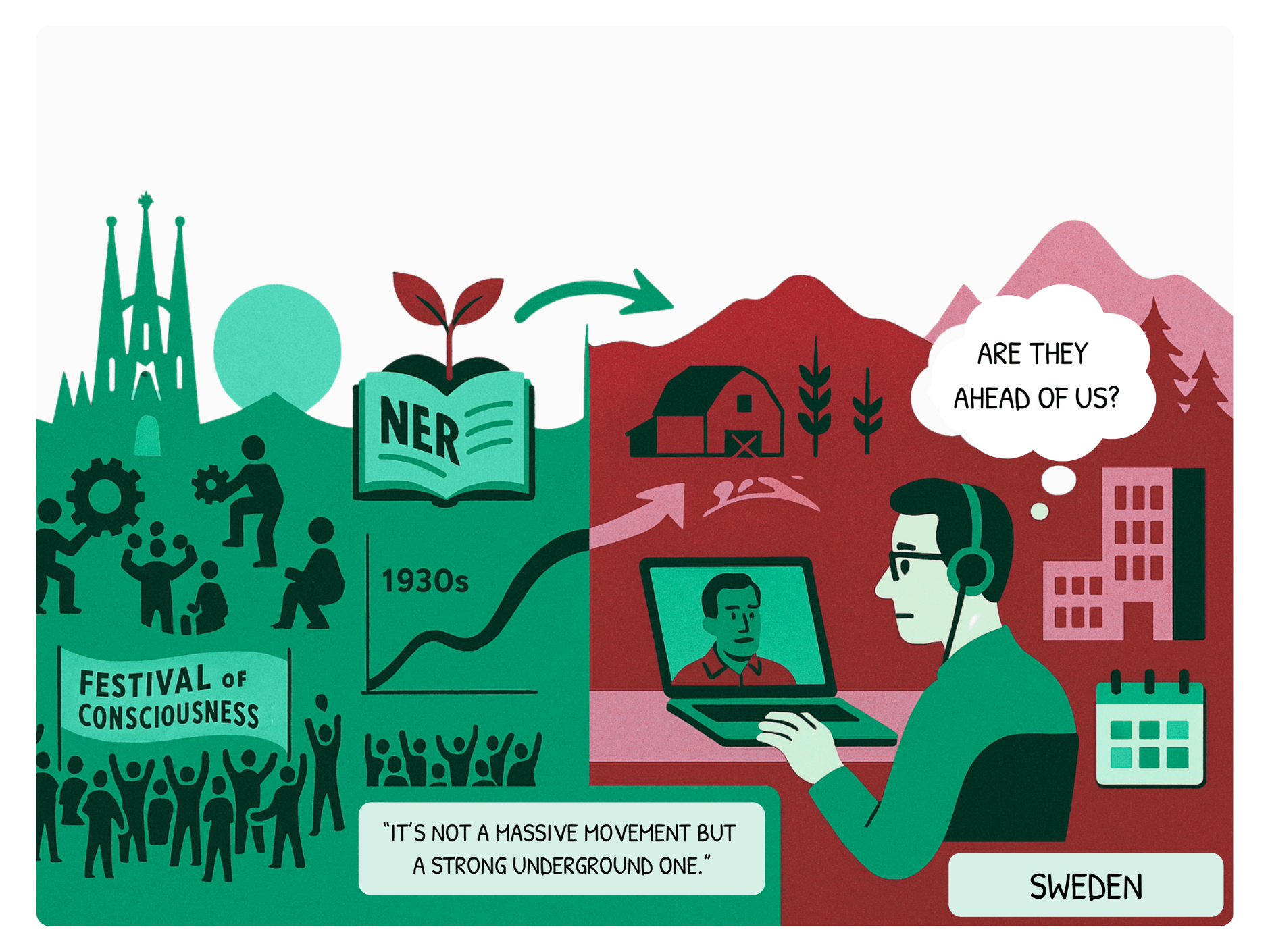Is Spain ahead of Sweden when it comes to new ways of working?
 Karin Tenelius
16 May 2025
Karin Tenelius
16 May 2025


Sitting in Sweden, it looks to me that so much more is happening and progressing in Spain compared to here in Scandinavia where we pride ourselves on being so democratic and advanced.
I decided to have a chat with Xavier Costa, founder of Full Circle, on Zoom and ask him what he is seeing.
Xavier starts by saying: “It’s not that there’s a massive movement in corporate Spain, it’s more of a strong underground movement that sometimes shows up in traditional media with an article about a company that transformed to being self-organised.”
There are basically three sources that have been the drivers of this movement, he told me. First and foremost it is the work Koldo Saratxaga started in 2005, which led to over 100 companies transforming and starting to work in self-organisating ways using what is now called the NER approach (Nuevo Estilo de Relaciones, or New Style of Relationships). The company supporting all those businesses in the change process is called K2K Emocionando and has made a huge impact, stirring interest and curiosity in thousands and thousands of people. Koldo and his partners have been giving seminars and workshops to share their knowledge and experience, sparking a widespread and growing network. (You can read more about this in my colleague Lisa’s blog here.)

Illustration by Andy de Vale
The second source, Xavi says, is the advent of cooperatives which emerged from 1840 onwards, especially in the agriculture sector. The evolution of the cooperative movement in Spain has been inconsistent over the years, depending on the country’s political ideology at the time. When Frederic Laloux’s book, Reinventing Organisations, came out 2014, many of the cooperatives found his ideas in line with their founding principles, and started to adapt self-management.
The third source of the new ways of working movement, Xavier tells me, is that Catalonia was a region of great innovation and creativity before Franco came into power. It has also had a history of anarchist movements. In fact, during the Spanish Civil War in 1936, anarchists effectively controlled Barcelona for nearly a year after resisting a fascist military uprising. Workers collectivised many industries, including transport, telecommunications and manufacturing. Wages were often equalised (now a feature of the NER approach to organisation transformation) and there was a push for gender equality. In the Basque country, where most of the NER companies are, there has also been a strong history of worker unions. Perhaps there is a correlation between worker solidarity and resilience and resourcefulness during times of oppression that lends itself well to the ideology of self-managing organisations.
More recently, in 2023, Xavier Ginesta, founder of Voxel, organised an event called The Festival of Consciousness in Barcelona. Last year it attracted more than 6,000 participants, and it shows the extensive interest in new ways of working and being together. Informal networks have grown from those three main sources, Xavier Costa states, and many events happen in a self-organising way. Corporate Rebels, a company founded in the Netherlands, is also a main spearhead of the self-managing organisation movement. Xavier Costa and his colleagues have started a “Rebel Cell” in Spain, an intentional community that supports organisations transitioning to self-management and is part of a global network of Rebel Cells, including countries like the US, Germany and Japan.

(Image above: A gathering of the Rebel Cell Spain community)
I ask Xavier if it is also a matter of good timing. He replies: “Well, employee engagement is low; 91% of the work force is not engaged at work. Only 9% are, according to the latest Gallup report, and the burnout-rate at workplaces is skyrocketing, so there are many good reasons for finding alternatives that work better for people.”
If I compare what Xavier shared with me to what I see here in Sweden, here are some reflections.
We don’t have so many examples of self-managing organisations in Sweden compared to NER’s 100+ cases. We of course had early pioneers like Björn Lundén, who founded a self-organised publishing house in 1987, and Mats Birgersson, who turned the failing manufacturing company Fresh around successfully by integrating self management in 1994, and finally Kjell Angergård who did the same at Önos from 1975. I also led some self-management transformations myself in Sweden in the nineties and early 2000s, either as a consultant or interim CEO, or by buying and transforming companies. (You can read about those stories in my book.)
Self-organised companies in Sweden today like Centigo, Netlight, Mpya Digital, Qamcon, and Trimero are very few. Many are small and most of them are not so spoken about in the media.
As a reaction against New Public Management, the trend of Trust Based Management has been strong and widespread in Sweden, even being endorsed by the Government. But it seems that unfortunately, like many previous trends, it has ended only in theory and words, rather than real change.
I also believe that our tendency in Sweden to assume that we are best in class when it comes to things like gender equality and modern leadership stops us from having an appetite for improving. I admit that Swedish leadership has its qualities, like wanting to involve people, a cultural norm of humility, and being less hierarchical, but we still have a lot of potential. In fact, I think we are pretty blind to the fact that the leadership style here is rapidly becoming outdated. This has been shown, for example, in the research team of Robert Lundmark, Susanne Tafveling and Andreas Stenling (Umeå University) in a study called ‘Organizational change from a leader’s perspective: change characteristics as antecedents to leaders’ role clarity and laissez-faire leadership behaviors’.
If we want more progress in workplaces in Sweden, we could learn from Spain by highlighting more examples of companies transforming, and fostering communities where we can learn from each other. Even if the employee engagement rate for Sweden is at 24%, a bit higher than Spain’s at 9%, we still have great room for improvement and we have other challenges such as escalating sick leave rates. We need to break out of our complacency and live up to our potential!
Want to learn more or talk to someone at Tuff?
Email us at [email protected] or call us on +46 (0)8-446 16 20.
Or read more about our training programmes or our other services.
